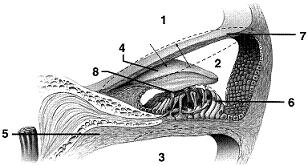When an organism dies, its muscles remain in a contracted state termed rigor mortis for a brief period of time. Contributing most directly to this phenomenon is
A. the lack of calcium to bind to troponin.
B. the absence of an oxygen supply to muscle.
C. the inability to synthesize actin and myosin.
D. the lack of ATP to break cross-bridges between thick and thin filaments.
Answer: D
You might also like to view...
The signal recognition particle (SRP) functions in
A. recognizing an ER signal sequence and binding to an SRP receptor in the ER. B. binding to a newly translated protein and escorting it to the cell membrane, the cytoplasm, or the Golgi. C. binding to a signal rRNA molecule and allowing it to exit the nucleus and associate with ribosomal proteins. D. determining the destination of a vesicle that buds from the Golgi. E. marking an organelle for destruction by lysosomes.
Food for the continental shelf benthic community primarily comes in the form of
a. migratory fish. b. living kelps. c. detritus. d. plankton. e. nutrients from terrestrial runoff.
In Figure 43-3, the vestibular canal is labeled:a
1
b. 2
c. 3
d. 7
e. 8
Which lineage includes lizards and snakes?
a. Sphenodontia b. Squamata c. Testudines d. Archosauromorpha